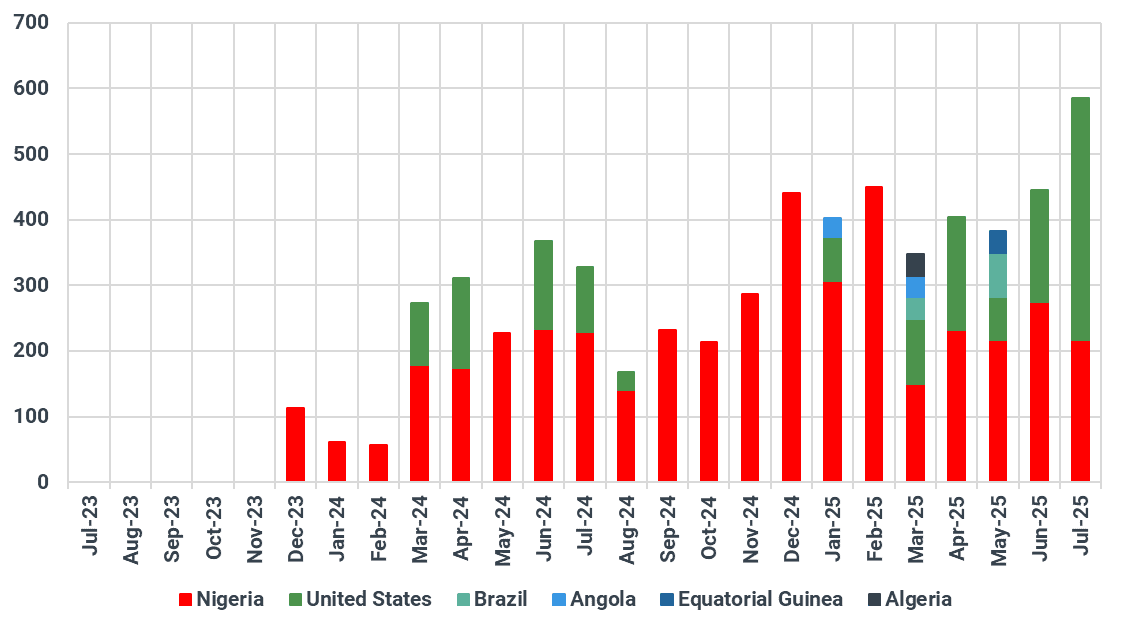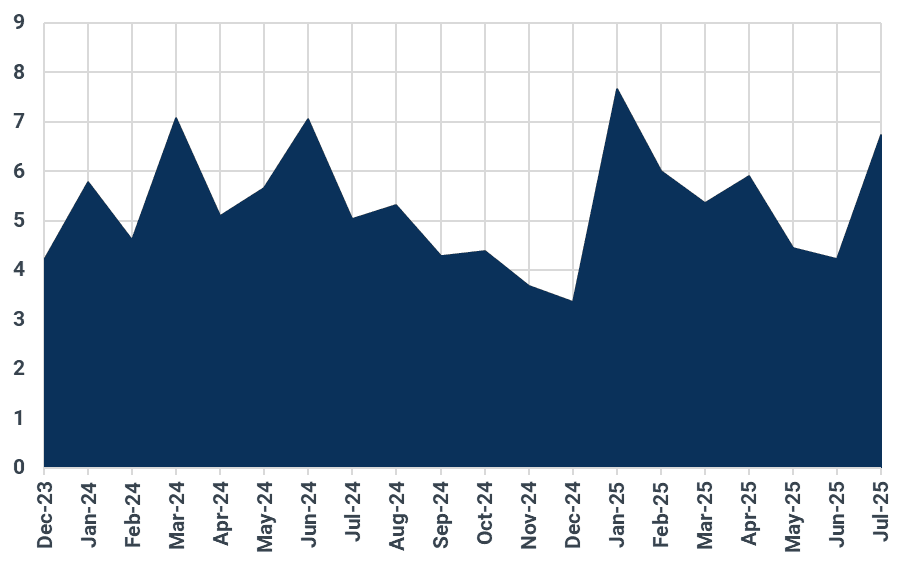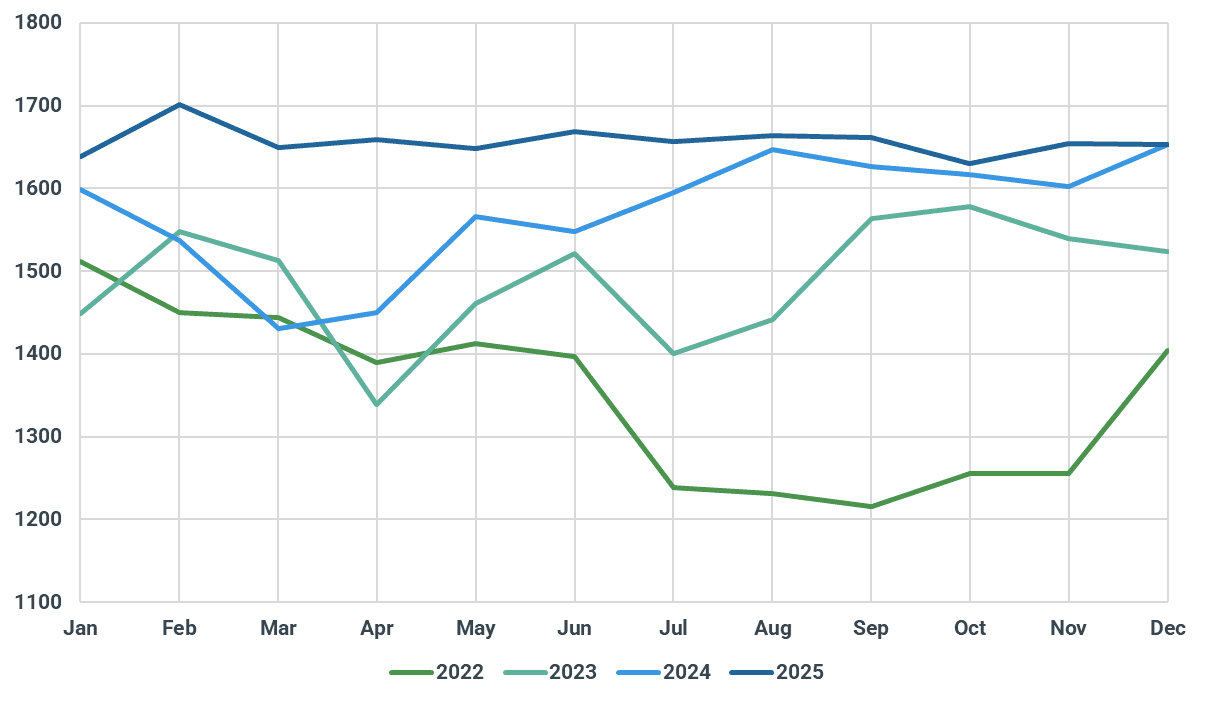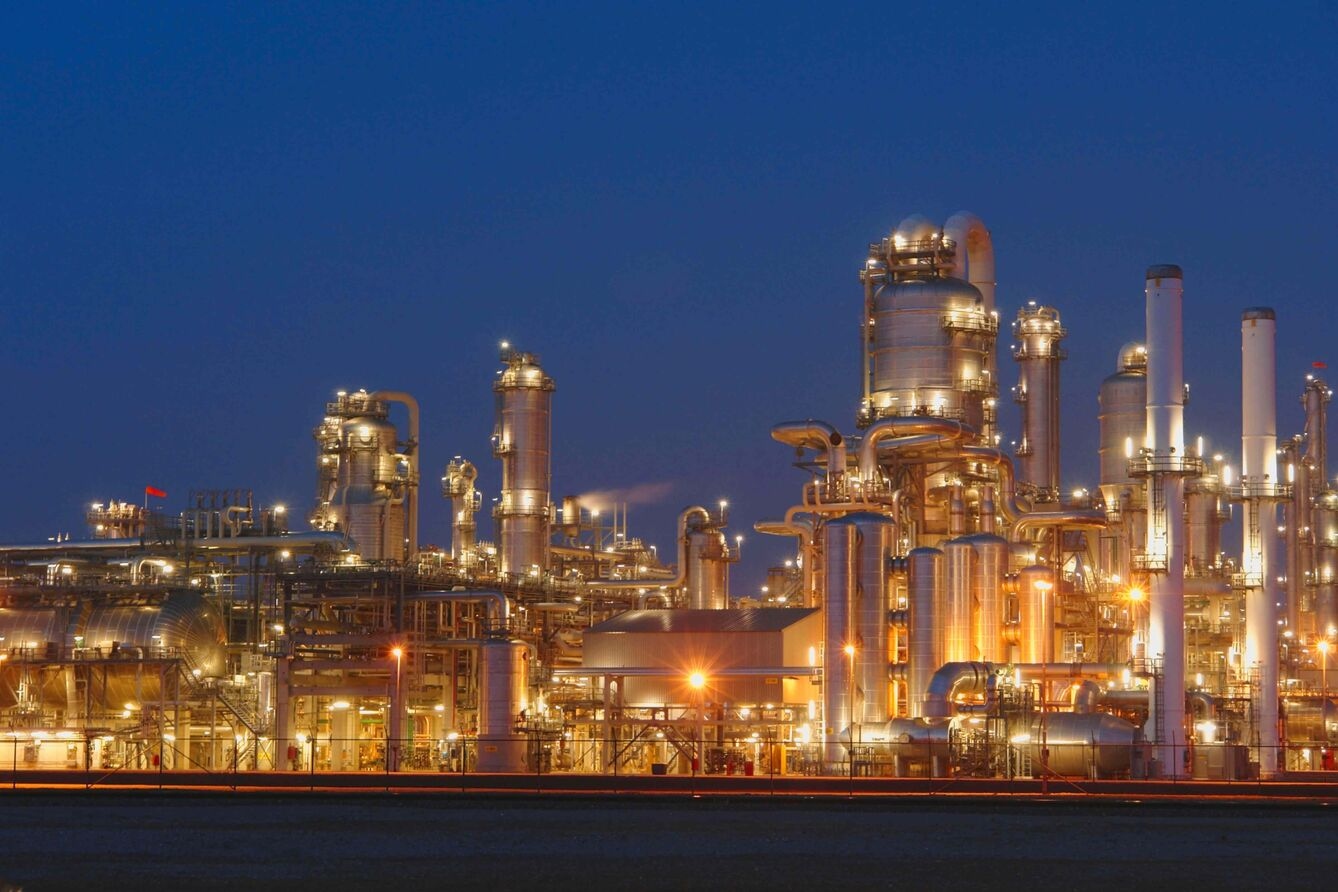US crude overtakes Nigerian barrels in Dangote's import mix
In July, the Dangote refinery’s crude imports surged to a record 590 kbd—driven largely by U.S. barrels overtaking Nigerian supply for the first time—amid ongoing domestic sourcing challenges. The refinery is currently operating at 420–450 kbd with plans to ramp up throughput and gasoline output, though full capacity utilization remains unlikely before Q4 2026 due to persistent mechanical and operational constraints.
Market & Trading calls:
• Bullish on Dangote refinery runs in Q3 given elevated crude imports to the facility in July
• Neutral on Dangote's product exports which already jumped to record highs this month
• Bullish on Nigeria crude/co exports in the mid to long term, supported by onshore gains from local operators and reduced pipeline disruptions
Dangote refinery
In July, crude imports into the Dangote refinery surged to 590 kbd—the highest monthly volume on record. Notably, U.S. crude made up a substantial 60% (370 kbd) of the total, while Nigerian grades accounted for just 40% (220 kbd), primarily comprising Amenam, Bonny Light, and Escravos. While WTI has held a significant share in Dangote’s import slate since March, this is the first time U.S. crude has overtaken Nigerian supply—a shift driven by several factors. WTI has been more competitively priced than certain domestic options, especially as U.S. barrels struggled to find traction in Asia amid rising OPEC+ output and multi-month lows in Murban spot premiums in May. At the same time, securing domestic crude for the refinery has remained an ongoing challenge. Despite an agreement with NNPC enabling Dangote to receive crude in local naira since October 2024, actual deliveries have consistently fallen short of agreed volumes. Dangote and other local refineries have cited NNPC’s underperformance in meeting supply obligations as a recurring issue.
Dangote crude imports, kbd

Source: Kpler
Dangote’s crude inventories rose to 6.73 Mbbls in July, reflecting a 2.5 Mbbls m/m increase, suggesting that a portion of the elevated import volumes has been directed into storage.
We estimate the refinery is currently operating at 420–450 kbd (65–70%), up from around 400 kbd (60%) in Q1 this year. Throughput is expected to ramp up further to 450–500 kbd in Q4. These elevated run rates are also reflected in record-high product exports in July, currently at 360 kbd. The bulk of this consists of gasoline—primarily sold domestically, though some volumes have been exported to Oman and Ivory Coast—and jet fuel, destined for West Africa (WAF) and Northwest Europe (NWE).
Dangote crude inventories, MMbbls

Source: Kpler
Last week, reports emerged that the facility is considering an expansion of nameplate capacity from 650 kbd to 700 kbd, though no specific timeline has been provided. With a gasoline yield of 46%, such an expansion would raise potential gasoline output to 322 kbd, up from an initial 300 kbd. However, it is important to note that expecting Dangote to run at full capacity on a sustained basis would be highly optimistic, given the likelihood of frequent mechanical issues and ongoing maintenance requirements. As such, we do not anticipate the refinery approaching full utilization before Q4 2026.
We currently estimate domestic gasoline production at Dangote at approximately 100 kbd, with volumes expected to increase further over the summer. A clear indication of efforts to maximize gasoline yields was the arrival of condensate naphtha in early July, with Dangote importing around 22 kt/month (6 kbd) to feed its hydrotreater for gasoline production. These naphtha imports underscore ongoing operational challenges at the refinery’s 204 kbd RFCC unit, which has been grappling with reactor and regenerator issues since January. Earlier cooling water system failures have also contributed to reduced throughput and have prevented the refinery from increasing its overall crude processing rate. Looking ahead, we forecast gasoline output at Dangote to rise to 150 kbd in Q3, with a further increase to 180 kbd expected in Q4.
Nigeria upstream outlook
Meanwhile, Nigeria’s indigenous oil firms are increasingly taking center stage in the upstream sector, leveraging the withdrawal of international majors and improved stability in onshore operations. Crude and condensate supply held steady at 1.75 Mbd in July, lifting the 3-month average to its highest level in over five years, driven by rising onshore output and fewer pipeline disruptions. At Jones Creek, reduced pipeline outages have supported higher flows to the Ugo Ocha terminal, with exports doubling to 65 kbd in recent months. Operator Neconde has complemented pipeline flows with barging operations to ensure effective alternative evacuation from onshore fields, an adaptive logistics strategy now common among indigenous players.
Among key grades, CJ crude production reached its highest level of the year in June, reaching 55 kbd, according to the NUPRC. Although previously a regular feedstock for Dangote, recent cargoes have been shipped to Canada’s Point Tupper and re-exported to the US. As mentioned earlier, the refinery’s intake of domestic crude declined to 220 kbd this month, down from 275 kbd last month, coinciding with record-level imports from the US at 370 kbd. Despite its stated intention to prioritise Nigerian supply, Dangote’s current crude slate suggests a more flexible sourcing strategy, which will largely be based on commercial incentive.
Nigeria's crude/co supply

Source : Kpler
Looking ahead, we expect Nigeria’s crude/co supply to average around 1.65 Mbd throughout the rest of the year—a stable level, with no significant new fields expected in the coming months, though still a marginal increase compared to H2 last year. Nevertheless, activity among local producers continues to build, with significant gains possible from next year. Companies like Seplat are working to boost output by restarting shut-in wells and launching new drilling campaigns across the former ExxonMobil blocks, according to their latest financial results. Infrastructure is also expanding: the Otakikpo terminal, developed by Green Energy, completed its first crude export in June aboard the Suezmax Lipari, becoming Nigeria’s first privately built onshore terminal in over five decades. Conoil has completed its first Obodo crude shipment, while Renaissance Africa Energy is preparing to scale up production following its acquisition of Shell’s onshore assets.
Want market insights you can actually trust?
Kpler delivers unbiased, expert-driven intelligence that helps you stay ahead of supply, demand, and market shifts.
Trade smarter. Request access to Kpler today.

See why the most successful traders and shipping experts use Kpler













